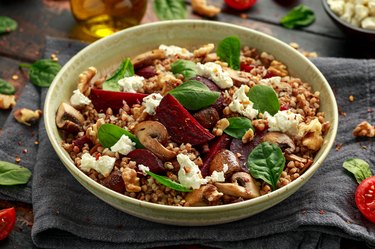
More than 1 million medical visits in America each year are due to kidney stones, according to the University of Pittsburgh Medical Center. And about 9 percent of American adults develop kidney stones at least once in their lives, per a February 2018 study in Advances in Urology.
Not only are kidney stones painful to pass, but they're also linked with an increased risk of chronic kidney disease, diabetes, heart disease and high blood pressure.
Video of the Day
Video of the Day
But the food you eat (or don't eat) may help if you have a history of kidney stones, according to Harvard Health Publishing.
What Are Oxalates?
Oxalates, or oxalic acid, are plant-based compounds that naturally occur in many foods, such as fruits, vegetables, legumes, nuts and seeds. Oxalates bind to calcium in the urine, which can lower mineral absorption and increase the risk of kidney stones in some people.
Urine contains waste products such as oxalates, and crystals can begin to form when urine contains too much waste and not enough liquid. Eventually, these small crystals can stick together, forming a larger, hard crystal known as a kidney stone, according to the National Kidney Foundation. Worldwide, about 80 percent of kidney stones are the calcium oxalate type, according to the National Library of Medicine.
However, most people may not need to limit their intake of oxalates — especially if they don't have any history of kidney stones. Oxalate-rich foods are also very nutrient-rich and may help prevent diabetes, high blood pressure or high cholesterol, according to a July 2015 review in the journal Clinical Nutrition Research.
How Many Oxalates Should You Get?
If you're at a high risk of developing calcium oxalate kidney stones, you may benefit from a diet low in oxalates. A low-oxalate diet consists of 50 to 100 milligrams of oxalates per day, according to the University of Chicago.
Make sure to consult with your physician before making any dietary changes.
Eating enough calcium, staying hydrated and reducing sodium intake are all crucial in preventing calcium oxalate kidney stones, according to the National Kidney Foundation.
Eating calcium-rich and oxalate-rich foods together may also help as the oxalate and calcium in these foods will bind together before entering the kidneys, leading to less calcium in the urine and a lower chance of kidney stone formation.
Foods High in Oxalic Acid
If you're at high risk of kidney stones, consider avoiding or limiting these foods high in oxalic acid. Note that the oxalate amounts below are based on the University of Chicago's foods high in oxalic acid chart.
1. Spinach: 755 mg
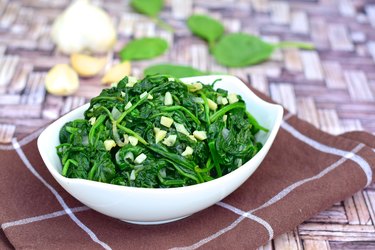
Popeye might inspire you to eat your fair share of spinach, but if you're at a high risk of calcium-oxalate kidney stones, you may want to watch out. Spinach is by far the highest food source of oxalate. A 1/2 cup of cooked spinach packs 755 milligrams of oxalate, and 1 cup of raw spinach has 656 milligrams.
Of course, eating leafy greens is good for your health, so you'll be pleased to hear that there are low-oxalate options like bok choy, kale, and romaine lettuce that you can swap for spinach.
2. Rhubarb: 541 mg
Rhubarb is known for the delicious tart flavor it adds to baked goods (hello, strawberry rhubarb pie!), but it belongs at the near top of the list of foods high in oxalates. Half a cup of rhubarb has 541 milligrams of oxalates.
If you do still want to bake a strawberry pie, consider making it without the rhubarb. Strawberries are pretty low in oxalates, with only 2 milligrams per 1-cup serving.
3. Buckwheat Groats: 133 mg
Although the name might make you think otherwise, buckwheat groats are gluten-free and don't contain wheat. They can be cooked and eaten like rice or added to soups and salads.
Buckwheat is rich in fiber, minerals and antioxidants, and has been linked with stable blood sugar and lower cholesterol levels, according to Harvard Health Publishing. But if you're following a diet low in oxalates, you may want to avoid or limit your intake.
A 1-cup serving of cooked buckwheat groats provides 133 milligrams of oxalates. Instead, try white rice, another gluten-free grain, which contains only 4 milligrams of oxalates in 1 cooked cup.
4. Almonds: 122 mg
If you are at risk of calcium oxalate kidney stones, you may want to limit your intake of certain nuts, especially almonds, because of their high oxalate content. A 1-ounce serving (about 22 almonds) packs 122 milligrams of oxalates.
Instead, try swapping almonds for pistachios, which have 14 milligrams of oxalates per a 1-ounce serving (about 48 pistachios). That way, you still get the benefit of heart-healthy unsaturated fats. Just choose a bag that's unsalted so that you keep your sodium intake in check.
5. Miso Soup: 111 mg
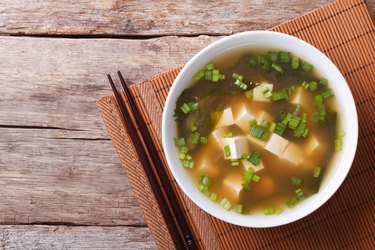
Miso soup is made with fermented soybean paste and seaweed. While this soup is considered relatively healthy, it's also high in oxalates. There are 111 milligrams of oxalates in 1 cup of miso soup.
If you're still in the mood for soup, but looking for a low-oxalate alternative, swap it for chicken noodle soup, which only has 3 milligrams of oxalates per can.
6. Corn Grits: 97 mg
If you're following a low-oxalate diet, eating grits might put you over your limit. One cup of corn grits has 97 milligrams of oxalates. If you still want to eat grits, make them with milk to boost the calcium in the dish. Milk and other calcium-rich ingredients make high-oxalate foods slightly more favorable when it comes to preventing kidney stones.
Otherwise, consider swapping corn grits for cooked oatmeal, which is oxalate-free, and try these overnight oats recipes.
7. Baked Potato: 97 mg
Baked potatoes are healthier than some people give them credit. While they may be high in carbs, they are also rich in fiber, vitamin C and potassium. Nevertheless, they are also high in oxalates: A medium baked potato with skin contains 97 milligrams of oxalates.
If you want to eat fewer oxalates, swap a baked potato for sweet potatoes. One cup of cooked sweet potatoes contains 28 milligrams of oxalates, which is about one-third less than a baked potato. Try these healthy sweet potato recipes.
8. Soybeans: 96 mg
Soybeans, or edamame, serve as a healthy, plant-based protein. On the flip-side, these legumes are high in oxalates, providing 96 milligrams per 1 cup.
If you're on the hunt for a lower-oxalate soy-based protein, consider tofu. A 3.5-ounce serving of tofu only contains 13 milligrams of oxalates. To cook it like a pro, try these flavorful, high-protein tofu recipes.
9. Bulgur: 86 mg
Bulgur is a high-oxalate grain, with 1 cup of cooked bulgur containing 86 milligrams of oxalates.
Swap bulgur with lower-oxalate grains like couscous or white rice, which have 15 milligrams and 4 milligrams of oxalates per 1 cooked cup serving, respectively.
10. Beets: 76 mg
Beets are vibrant, nutrient-rich vegetables packed with copper, potassium, manganese and antioxidants. But if you're on a low-oxalate diet, you may want to avoid them or limit your intake. A 1/2 cup of beets has 76 milligrams of oxalates.
Navy beans are probably best known for being the type of bean used in baked beans. With 76 milligrams of oxalates per 1/2-cup serving, these beans are especially high in oxalates.
Swap navy beans with red kidney beans, which contain 15 milligrams of oxalates for the same 1/2-cup serving.
12. Hot Chocolate: 65 mg
Chocolate isn't the best food to eat when it comes to lowering oxalate intake, and hot chocolate is no exception. One cup of hot chocolate contains 65 milligrams of oxalates.
Instead, swap hot chocolate with chocolate milk, which only has 7 milligrams of oxalates per 1 cup. A bonus: 1 cup of chocolate milk provides 21 percent of the DV for calcium, which helps prevent kidney stones.
13. Brownies: 62 mg
Brownies may be a chocolate lover's dream, but you may want to enjoy them in moderation if you're at risk of developing kidney stones. One 2-ounce brownie has 62 milligrams of oxalates.
If you're looking for lower oxalate desserts, swap brownies for oatmeal cookies, chocolate chip cookies or apple pie.
14. Okra: 57 mg
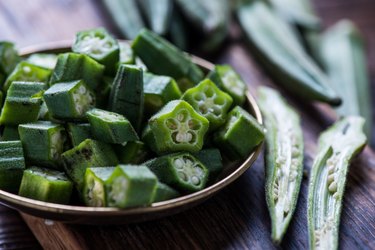
Okra is a vegetable (technically a fruit, actually) with many versatile uses and is commonly added to soups, fried, pickled or used as a thickening agent in gumbo. You may want to keep your okra intake low if you're on a low oxalate diet, though. A 1/2-cup serving of okra has 57 milligrams of oxalates.
15. Bran Flakes With Raisins: 57 mg
If you tend to eat raisin bran cereal in the morning, you might want to reconsider your breakfast if you're following a diet low in oxalic acid. One cup of raisin bran flakes has 57 milligrams of oxalates.
However, pairing this cereal with calcium-rich milk will help lower your risk of kidney stones by increasing your daily calcium intake. One cup of low-fat milk packs 23 percent of the DV for calcium.
16. French Fries: 51 mg
There are a few reasons to limit your intake of fries if you're at risk of developing kidney stones. French fries are high in oxalates, with 51 milligrams in a 4-ounce serving.
They're also high in sodium, providing 20 percent of the DV in that same serving size. To prevent any type of kidney stones, the National Institute of Diabetes and Digestive and Kidney Diseases (NIDDK) suggests reducing your sodium intake.
17. Cashews: 49 mg
Nuts like cashews offer heart-healthy benefits, thanks to their unsaturated fat content and nutrient-rich profile. But, similarly to almonds, cashews are high in oxalates. A 1-ounce serving (about 18 cashews) provides 49 milligrams of oxalates.
Instead of cashews, try lower-oxalate nuts and seeds, such as pistachios, pecans, pumpkin seeds, sunflower seeds and flax seeds. All of these options have fewer than 20 milligrams of oxalates per serving. It's easy to snack on nuts and seeds, so keep the serving size in mind to keep your oxalate intake low.
18. Raspberries: 48 mg
Raspberries are incredibly nutritious, rich in antioxidants, vitamin C and manganese. They are an excellent source of fiber as well, providing 28 percent of the DV per serving. However, 1 cup of raspberries also contains 48 milligrams of oxalates.
If you're on a low-oxalate diet, try swapping raspberries for low-oxalate berries like blackberries, blueberries and strawberries — they all contain only 4 milligrams of oxalates per 1-cup serving.
If you would rather not eliminate raspberries from your diet, consider pairing them with a calcium-rich food. In this case, a delicious duo would be raspberries and a cup of plain yogurt, which provides 38 percent of your DV of calcium.
19. Bagels: 40 mg
Although bagels are a fan-favorite breakfast option, they sometimes get a bad rap for their high-calorie and high-carb content. Another thing they're high in? Oxalates. A large, New York-style bagel packs 40 milligrams of oxalates.
You can still enjoy a bagel if you're watching your oxalate intake, though. Just swap a large, NY-style bagel for a small, regular bagel, and you'll only get 9 milligrams of oxalates.
20. Lentil Soup: 39 mg
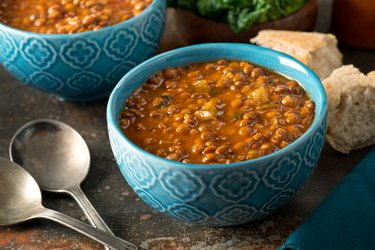
Lentils are rich in iron, zinc, manganese and folate, according to the USDA. But they are quite high in oxalates, with 1 cup of lentil soup providing 39 milligrams of oxalates.
For a lower-oxalate alternative, swap lentil soup with vegetable beef soup, which only contains 5 milligrams of oxalates per 1-cup serving.
- Advances in Urology: "Kidney Stone Disease: An Update on Current Concepts"
- National Kidney Foundation: "6 Easy Ways to Prevent Kidney Stones"
- National Kidney Foundation: "What Are Oxalates and Why are They a Concern for Kidney Disease Patients?"
- Clinical Nutrition Research: "Nutritional Management of Kidney Stones (Nephrolithiasis)"
- Mayo Clinic: "Kidney Stones"
- Wake Forest Baptist Health: "Kidney Stones"
- Health.gov: "Dietary Guidelines for Americans, 2015-2020: Appendix 7. "Daily Nutritional Goals for Age-Sex Groups Based on Dietary Reference Intakes and Dietary Guidelines Recommendations"
- University of Chicago: "How to Eat a Low Oxalate Diet"
- University of Chicago: "The 179 High Oxalate Foods and Products"
- American Journal of Kidney Diseases: "Serum Uric Acid and Risk of Kidney Stones"
- Arthritis Foundation: "Safe Foods for Gout"
- American Kidney Fund: "Foods and Drinks to Avoid When You Have Gout"
- Annals of the Rheumatic Diseases: "Purine-Rich Foods Intake and Recurrent Gout Attacks"
- National Library of Medicine: "Kidney Stones"
- University of Pittsburgh Medical Center: "What Are Kidney Stones?"